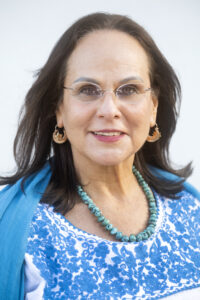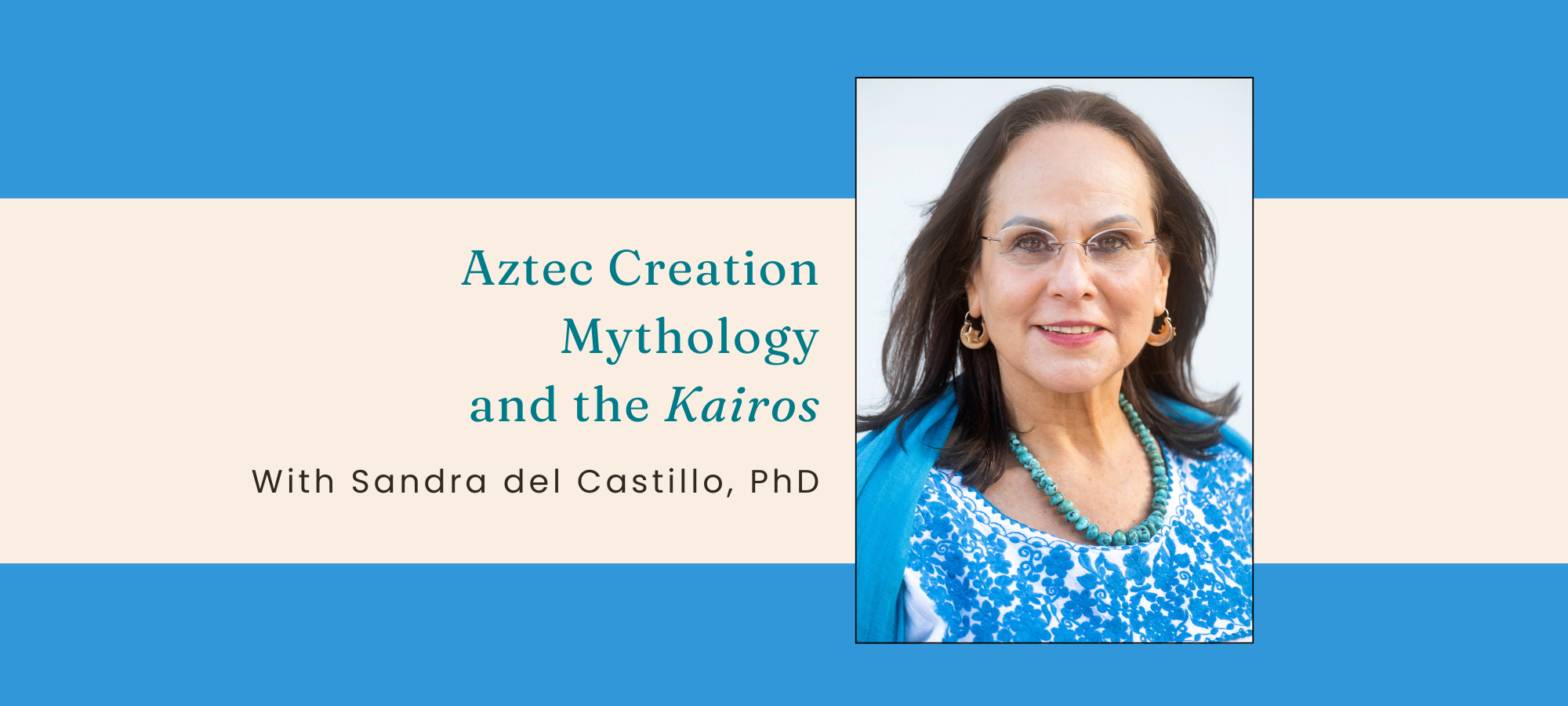Sandra del Castillo, PhD, is a teacher, ritual artist, and mythologist, as well as an alumni of Pacifica’s M.A./Ph.D. in Depth Psychology with Specialization in Jungian and Archetypal Studies program. Sandra will be a co-teacher of the “Applied Mythology Graduate Certificate 2025,” to be held June 26 – August 14, 2025. Register here.
The Applied Mythology Graduate Certificate has some amazing teachers and topics, but one that really caught my attention was Sandra’s class on “Aztec Creation Mythology and the Kairos,” in part because I don’t often see Aztec myths mentioned in works on depth psychology. Sandra is using the Aztec creation myth “Five Suns” in her course, so I asked her how this pairs well with archetypal thinking and Jung. She began by pointing out that “Jungian depth psychology is mythologically informed. The stories of myth are living blueprints, and mythic figures are styles and qualities of consciousness; when invoked, they guide, give meaning, and bring order to the inner chaos and its outward expressions. This is true both personally and as a collective.” She explained that “The Aztec creation myth of the Five Suns, is the living blueprint we use in this module, to navigate this collective crossroads for humanity. The Five Suns tells the story of the rise and fall of five Sun ages, of the sun gods who ruled over each, each with their distinct worldviews and forms of consciousness, and of the metamorphosis of the humans through each Sun. As our Anthropocene era and human-centric worldview faces its own fall, and Sixth Great Extinction, we turn to the ancient and archetypal ensouled worldviews for wisdom, exploring the anima mundi–the soul of the world, mirrored in the Mesoamerican cosmovision.”
I was curious as to the term “Kairos” as well, having only seen “Chronos” as a term in works on depth psychology. Sandra explained that “In the 1950’s, Jung warned future generations that we could destroy ourselves through the might of our science and technology. So much is at stake he said, and so much depends on the psychological constitution of humanity. He foresaw this crossroads as a kairos moment; the Greeks had two words for time: chronos and kairos. Chronos is the time we measure by clocks and calendars. Whereas the kairos is a portal; a fortuitous and opportune moment, and as Jung saw it, the right moment for ‘a metamorphosis of the gods,’ meaning a change of worldview. Imagination plays a critical role in the kairos, as this module explores.”
So, what inspires Sandra’s interest in Mesoamerican mythology and the Mexican Day of the Dead? “Once upon a time, I lived in a small mask-making village with my three school age children in Michoacán; a region of Mexico renowned for its Day of the Dead tradition; it is home to the Purépecha people and my paternal ancestry. As part of my ritual art practice, I began researching not only my ancestral mythology, but the mythologies of the three other states in which I lived, as well as the Maya. Many moons later, the bedazzling and numinous tribute to the ancestors inspired my dissertation on the Mexican Day of the Dead, and deeply kindled my interest in the Mesoamerican cosmovision and mythology.”
Sandra’s dissertation was for Pacifica’s Jungian and Archetypal Studies program. She affirmed that her “ritual art led me to Joseph Campbell, which led me to Pacifica. Ritual art gives expression to dreams, myth, and visions; it is a way to both honor image as psyche, and to reap its transformative and healing gold.” Of her time studying here, she said, “My studies at Pacifica gave me a depth psychological framework for my vocation, and with it, an understanding that allowed me to deepen into it, and adapt it as a teaching tool. It is the lens I take to my lectures, presentations, workshops, and ritual; all serve as research and preparation for forthcoming books.”
In wrapping up our conversation, I asked Sandra what she has planned that we might like to know about. She already hosts an amazing podcast called “Blue Medicine Journal,” which is “a monthly podcast of stories and conversations grounded in Jungian depth psychology, and dedicated to our Mother Earth, imagining the world anew in this kairos moment.” But coming in September, she will be inaugurating “‘Blue Dreams Café: Dream Tending and Ritual Art in the Kairos.’ Blue Dreams Café is an immersive presentation on Jungian dream tending, and sacred gathering, where participants can share a dream, learn dream tending skills, and give creative expression to a dream through collage. Our dreams are both personal and collective; they are the riddles we will share and decipher to navigate this kairos moment.”
For more information and to register for the “Applied Mythology Graduate Certificate 2025,” to be held June 26 – August 14, 2025, visit us here.

Sandra del Castillo, PhD, is a teacher, ritual artist, and mythologist, specializing in Mesoamerican mythology and the Mexican Day of the Dead. She earned her PhD in Jungian and archetypal depth psychology at Pacifica Graduate Institute, where she teaches adjunct. Sandra lectures and teaches courses both online and in person, and leads workshops in ritual art– bringing creative expression to myth, dreams, and imagination, for personal and collective transformation. Sandra is the host of “Blue Medicine Journal: A Jungian Podcast,” storytelling and conversations in the kairos, a podcast dedicated to soul-tending, re-enchantment, and re-imagining our Earth.
The Blue Dreams Café will be both online and in person and will be announced closer to the date on my social media: @blue_medicine_journal on Instagram, Facebook, and Bluesky.

Angela Borda is a writer for Pacifica Graduate Institute, as well as the editor of the Santa Barbara Literary Journal. Her work has been published in Food & Home, Peregrine, Hurricanes & Swan Songs, Delirium Corridor, Still Arts Quarterly, Danse Macabre, and is forthcoming in The Tertiary Lodger and Running Wild Anthology of Stories, Vol. 5.


